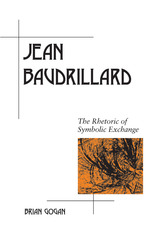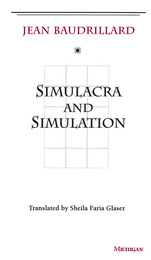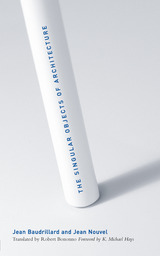7 books about Baudrillard, Jean

Cool Memories II, 1987-1990
Jean Baudrillard
Duke University Press, 1996
Jean Baudrillard is widely recognized as one of the most important and provocative writers of our age. Variously termed “France’s leading philosopher of postmodernism” and “a sharp-shooting Lone Ranger of the post-Marxist left,” he might also be called our leading philosopher of seduction or of mass culture. Following his acclaimed America and Cool Memories, this book is the third in a series of personal records in hyperreality. Idiosyncratic, outrageous, and brilliantly original, Baudrillard here casts his net widely and combines autobiographical memories with further reflections on America, the crisis of cultural production, new ideas in fiction/theory, and the “verbal fornication” of the postmodern.
In this wide-ranging discussion of events and ideas, Baudrillard moves between poetry and waterfalls, strikes and stealth bombers, Freud and La Cicciolina, shadows and simulacra, deconstruction and the zodiac, Reagan’s smile and Kennedy’s death, the “curse” on South America and the future of the West, the last tango of French intellectual life and the exemplary disappearing act of Italian politics. Writing at the site where the philosophic and the poetic merge, he once again offers us commentary in the form of the riveting insight, the short distillation of reality that establishes its truth with the force of recognition.
Cool Memories II, Baudrillard’s latest commentary on the technopresent and future, an installment of his reflections on the reality of contemporary western culture, will entice all readers concerned with postmodernism and the current state of theory.
In this wide-ranging discussion of events and ideas, Baudrillard moves between poetry and waterfalls, strikes and stealth bombers, Freud and La Cicciolina, shadows and simulacra, deconstruction and the zodiac, Reagan’s smile and Kennedy’s death, the “curse” on South America and the future of the West, the last tango of French intellectual life and the exemplary disappearing act of Italian politics. Writing at the site where the philosophic and the poetic merge, he once again offers us commentary in the form of the riveting insight, the short distillation of reality that establishes its truth with the force of recognition.
Cool Memories II, Baudrillard’s latest commentary on the technopresent and future, an installment of his reflections on the reality of contemporary western culture, will entice all readers concerned with postmodernism and the current state of theory.
[more]

Fatal Strategies
Jean Baudrillard
Pluto Press, 1999

Heterology and the Postmodern
Bataille, Baudrillard, and Lyotard
Julian Pefanis
Duke University Press, 1991
In Heterology and the Postmodern, Julian Pefanis presents a new view of the history of poststructuralism (heterology) and the origins of postmodernism by analyzing three important French theorists, Georges Bataille, Jean Baudrillard, and Jean-François Lyotard.
Beginning with the introduction of Hegel in French postmodernist thought—largely but not exclusively through the thought of Georges Bataille—Pefanis argues that the core problematics of postmodern aesthetics—history, exchange, representation, and writing—are related to Bataille’s reconceptualization of the Hegelian framework. Pefanis explores how Bataille was influenced by Hegel, Marcel Mauss, Freud, and Nietzsche, and traces the effects of this influence on the analyses and critiques of later postmodernists, most notably Lyotard and Baudrillard. Finally, employing these postmodernists along with Freud and Jacques Lacan, Pefanis discusses discourse on postmodernism and its relation to Freud’s concept of the death drive.
This intellectual history makes valuable contributions to the debates over what the “postmodern” may mean for intellectual and political activity.
Beginning with the introduction of Hegel in French postmodernist thought—largely but not exclusively through the thought of Georges Bataille—Pefanis argues that the core problematics of postmodern aesthetics—history, exchange, representation, and writing—are related to Bataille’s reconceptualization of the Hegelian framework. Pefanis explores how Bataille was influenced by Hegel, Marcel Mauss, Freud, and Nietzsche, and traces the effects of this influence on the analyses and critiques of later postmodernists, most notably Lyotard and Baudrillard. Finally, employing these postmodernists along with Freud and Jacques Lacan, Pefanis discusses discourse on postmodernism and its relation to Freud’s concept of the death drive.
This intellectual history makes valuable contributions to the debates over what the “postmodern” may mean for intellectual and political activity.
[more]

Jean Baudrillard
In Radical Uncertainty
Mike Gane
Pluto Press, 2000

Jean Baudrillard
The Rhetoric of Symbolic Exchange
Brian Gogan
Southern Illinois University Press, 2018
Jean Baudrillard has been studied as sociologist, philosopher, cultural theorist, political commentator, and photographer. Brian Gogan establishes him as a rhetorician, demonstrating how the histories, traditions, and practices of rhetoric prove central to his use of language. In addition to Baudrillard’s standard works, Gogan examines many of the scholar’s lesser-known writings that have never been analyzed by rhetoricians, and this more comprehensive approach presents fresh perspectives on Baudrillard’s work as a whole.
Gogan examines both the theorist and his rhetoric, combining these two lines of inquiry in ways that allow for provocative insights. Part one of the book explains Baudrillard’s theory as compatible with the histories and traditions of rhetoric, outlining his novel understanding of rhetorical invention as involving thought, discourse, and perception. Part two evaluates Baudrillard’s work in terms of a perception of him—as an aphorist, an illusionist, an ignoramus, and an ironist. A biographical sketch and a critical review of the literature on Baudrillard and rhetoric round out the study.
This book makes the French theorist’s complex concepts understandable and relates them to the work of important thinkers, providing a thorough and accessible introduction to Baudrillard’s ideas.
Gogan examines both the theorist and his rhetoric, combining these two lines of inquiry in ways that allow for provocative insights. Part one of the book explains Baudrillard’s theory as compatible with the histories and traditions of rhetoric, outlining his novel understanding of rhetorical invention as involving thought, discourse, and perception. Part two evaluates Baudrillard’s work in terms of a perception of him—as an aphorist, an illusionist, an ignoramus, and an ironist. A biographical sketch and a critical review of the literature on Baudrillard and rhetoric round out the study.
This book makes the French theorist’s complex concepts understandable and relates them to the work of important thinkers, providing a thorough and accessible introduction to Baudrillard’s ideas.
[more]

Simulacra and Simulation
Jean Baudrillard
University of Michigan Press, 1994
The first full-length translation in English of an essential work of postmodernist thought
[more]

The Singular Objects of Architecture
Jean Baudrillard
University of Minnesota Press, 2005
What is a singular object? An idea, a building, a color, a sentiment, a human being. Each in turn comes under scrutiny in this exhilarating dialogue between two of the most interesting thinkers working in philosophy and architecture today. From such singular objects, Jean Baudrillard and Jean Nouvel move on to fundamental problems of politics, identity, and aesthetics as their exchange becomes an imaginative exploration of the possibilities of modern architecture and the future of modern life.
Among the topics the two speakers take up are the city of tomorrow and the ideal of transparency, the gentrification of New York City and Frank Gehry’s surprising Guggenheim Museum in Bilbao. As Nouvel prompts Baudrillard to reflect on some of his signature concepts (the virtual, transparency, fatal strategies, oblivion, and seduction, among others), the confrontation between such philosophical concerns and the specificity of architecture gives rise to novel and striking formulations—and a new way of establishing and understanding the connections between the practitioner and the philosopher, the object and the idea.
This wide-ranging conversation builds a bridge between the fields of architecture and philosophy. At the same time it offers readers an intimate view of the meeting of objects and ideas in which the imagined, constructed, and inhabited environment is endlessly changing, forever evolving.
Jean Baudrillard is one of the most influential thinkers of his generation and author of The Vital Illusion (2001).
Jean Nouvel has designed buildings throughout the world, including the new Guthrie Theater in Minneapolis, and is a recipient of France’s Grand Prix d’Architecture.
Robert Bononno, a translator and teacher, lives in New York City.
Among the topics the two speakers take up are the city of tomorrow and the ideal of transparency, the gentrification of New York City and Frank Gehry’s surprising Guggenheim Museum in Bilbao. As Nouvel prompts Baudrillard to reflect on some of his signature concepts (the virtual, transparency, fatal strategies, oblivion, and seduction, among others), the confrontation between such philosophical concerns and the specificity of architecture gives rise to novel and striking formulations—and a new way of establishing and understanding the connections between the practitioner and the philosopher, the object and the idea.
This wide-ranging conversation builds a bridge between the fields of architecture and philosophy. At the same time it offers readers an intimate view of the meeting of objects and ideas in which the imagined, constructed, and inhabited environment is endlessly changing, forever evolving.
Jean Baudrillard is one of the most influential thinkers of his generation and author of The Vital Illusion (2001).
Jean Nouvel has designed buildings throughout the world, including the new Guthrie Theater in Minneapolis, and is a recipient of France’s Grand Prix d’Architecture.
Robert Bononno, a translator and teacher, lives in New York City.
[more]
READERS
Browse our collection.
PUBLISHERS
See BiblioVault's publisher services.
STUDENT SERVICES
Files for college accessibility offices.
UChicago Accessibility Resources
home | accessibility | search | about | contact us
BiblioVault ® 2001 - 2024
The University of Chicago Press









